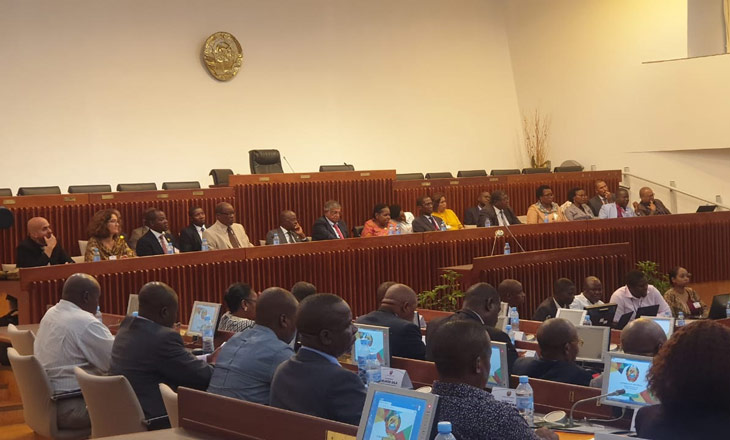The seminar for the induction of the members of the 9th legislature of the Mozambican Parliament took place between the 17th and 19th February 2020 and, in this context, on the 18th the discussions were around issues related to the conservation of biodiversity, with a view to broaden and facilitate the dissemination of information on the problem of climate change, at a global level and its incidence in countries like Mozambique.
Published at 21/02/2020
Deputies strengthen knowledge on Biodiversity Conservation and Climate Change Impact Mitigation

BIOFUND took the initiative to propose the issue to the Portuguese Parliament, its materialisation being the result of a joint work with the National Administration of Conservation Areas and partners such as USAID/SPEED+, WWF, UEM, FNDS, and World Bank, with financial support of USAID/SPEED+ and European Union.
For an hour and a half there was a succession of presentations held by: Abdul Magide Osman, BIOFUND’s Board Chair , who spoke on “Climate Change, Impact and Responses”; Alexandra Jorge, BIOFUND’s Programme Director, presenting movies on “The Importance of Biodiversity”; Mateus Mutemba, ANAC’s General Director, reporting on the “National System of Conservation Areas” and relevant legislation; and Carlos Serra, an environmentalist, speaking on “Cities, Sensitive Ecosystems and Resilience to Climate Change”, closed the cycle.
In his presentation, which served as a baseline to the session, Magid Osman stressed the fact that Mozambique is located in an area of the globe where the effects of climate change are most sensitive, with many cases of loss of territory due to rising sea levels. He explained that since this is a problem that has no simple answer, what is required is a revolution of collective mentality. Every government´s action must have a climate change response component.
Carlos Serra’s intervention, dramatically illustrated the impacts of climate change that are already sensitive in various parts of the country and underlined the fact that human action, such as the destruction of mangroves and the occupation of dunes and wetlands, affecting coastal ecosystems, is contributing to the worsening of the situation. In his view, the laws already exist but are little publicised and need further implementation.
Reacting to the different presentations, Ms Telmina Pereira, from Frelimo party, highlighted the fact that it was the first time she had heard so objectively about the impact of climate change in Mozambique. She stressed the need for an urgent response and recalled the important role that she plays in educating minds, such as through parliamentary days. She suggested a greater sharing of information but with the caution of using a more simplified language in order to better reach communities.
For its turn, Mr Venâncio Mondlane of Renamo party said that in his view the big problem with biodiversity conservation is not the behaviour of communities but that of individuals from the ruling classes who ostensibly ignore, for example, the ban on building in wetlands, particularly in mangrove areas. Mondlane has proposed rethinking the penalties for environmental crimes, which often, because of their scale, should enter the scale of crimes against humanity.
The session established that, already outside the induction programme for Members, BIOFUND will organise new activities to update information and deepen some of the issues raised.

